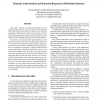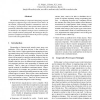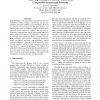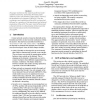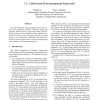111
click to vote
DISCEX
2003
IEEE
15 years 7 months ago
2003
IEEE
The security of a software system is an attribute that permeates the whole system. As such, any attempt to address security concerns in a software system must, of necessity, be gl...
130
click to vote
DISCEX
2003
IEEE
15 years 7 months ago
2003
IEEE
This paper¢ presents an authorization framework for supporting fine-grained access control policies enhanced with light-weight intrusion/misuse detectors and response capabiliti...
129
click to vote
DISCEX
2003
IEEE
15 years 7 months ago
2003
IEEE
Distributed systems require strategies to detect and recover from failures. Many protocols for distributed systems employ a strategy based on leases, which grant a leaseholder acc...
DISCEX
2003
IEEE
15 years 7 months ago
2003
IEEE
In this paper, we describe System Detection’s surveillance detection techniques for enclave environments (ESD) and peering center environments (PSD) and evaluate each technique ...
109
Voted
DISCEX
2003
IEEE
15 years 7 months ago
2003
IEEE
We introduce models for cooperative mitigating response strategies to suppress large scale Internet worm attack. In our models, cooperating members communicate with others using a...
106
click to vote
DISCEX
2003
IEEE
15 years 7 months ago
2003
IEEE
Huge challenges exist with systems and networks that must dependably satisfy stringent requirements for security, reliability, and other attributes of trustworthiness. Drawing on ...
107
click to vote
DISCEX
2003
IEEE
15 years 7 months ago
2003
IEEE
Secure group communication protocols have been designed to meet needs such as secure management of group membership, confidential group communication, and access control. New lan...
111
click to vote
DISCEX
2003
IEEE
15 years 7 months ago
2003
IEEE
This paper summarizes the research performed under DARPA’s Autonomic Distributed Firewalls (ADF) research project. The summary begins with a review of the motivation and objecti...
107
click to vote
DISCEX
2003
IEEE
15 years 7 months ago
2003
IEEE
The RT Role-based Trust-management framework provides policy language, semantics, deduction engine, and pragmatic features such as application domain specification documents that...

